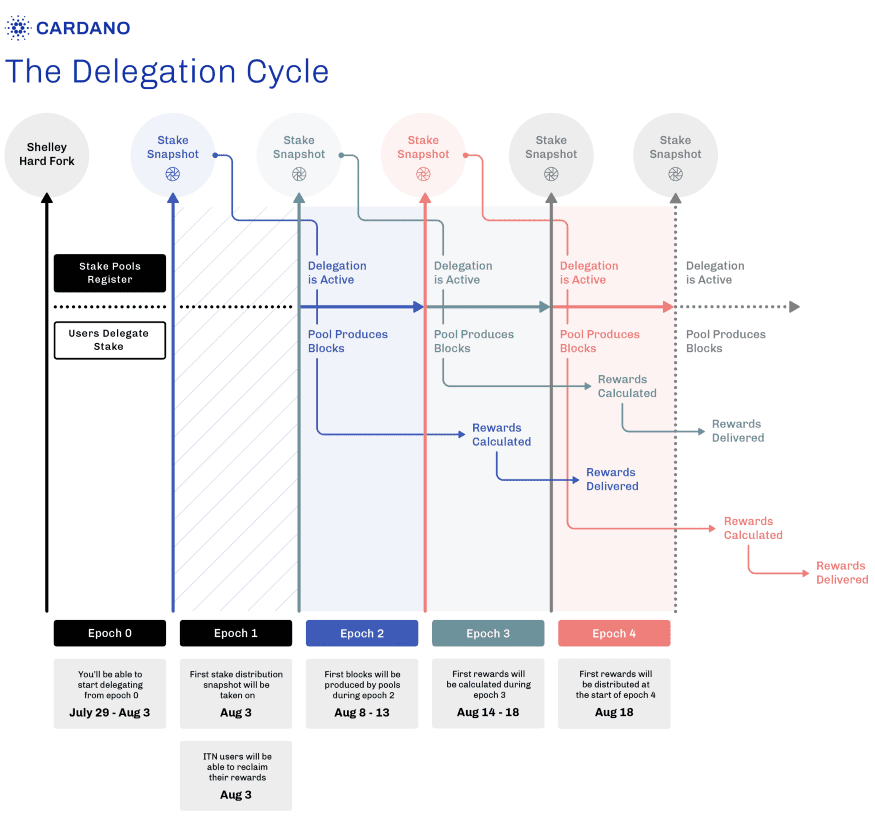A Stake Pool is a securely managed server node with multiple delegators’ aggregate stakes in one organization.
In this post, we’ll talk about the staking possibilities of the Cardano ecosystem. Staking Pools have been central to Ouroboros, the Cardano consensus protocol. They are liable for the transaction management and the creation of new blocks inside the Cardano blockchain. To be reliable and secure, Ouroboros needs many ADA owners to communicate with the network anytime.
Ouroboros depends on ADA holders, staking organizations, and institutions dedicated to the network and its protocols 24/7. Although a Proof of Stake algorithm, like Ouroboros, is cheaper to operate than a Proof of Work (the algorithm used by Bitcoin or Litecoin), it also has its costs. Stake pool owners are thus paid for operating the protocol in the form of rewards arising from the processing of transactions.
In the Carano network, staking is made using its native currency: ADA. A public staking pool is a public-address Cardano node that can be accessed by many other members and rewarded according to their stake in the node. The node operators keep for themselves a percentage of the rewards. Private nodes, on the other hand, retain all the rewards to the node operators. This only makes sense if the operators have sufficient ADA to make the node profitable, considering the cost of maintaining the node and the opportunity cost given by investing in a public pool without the burden of maintaining an IT infrastructure.
What is a Pool Operator?
A Pool Operator manages the staking pool. She must be a person or company with the experience and knowledge to keep the node operating without interruptions. If ADA holders want to take advantage of the protocol and receive ADA rewards yet don’t want to run the Cardano network node themselves, they should delegate to public stake pools. The more stake is assigned to a stake pool, the more likely the node will be selected as a slot leader and generate a new block with the corresponding reward.
When a Stake Pool is selected and generates a block successfully, the corresponding reward is divided proportionally between the node operators (according to a percentage parameter defined when the node is registered in the network) and the node’s delegators. The expected return on the investment is slightly higher than 5%. Extended research and development have been carried out to ensure a fair and sustainable competition that provides participatory benefits, rewards, time, energy, and resource expenditure.
Requirements For Running A Stake Pool
Every person or organization may opt for a staking pool, but pool operators should have the right technical skills and IT know-how. Cardano’s durability depends on stake pools.
The efficiency and reputation of pool operators are critical. Pools that undergo frequent downtimes will not be preferred to delegate their stakes. In extreme situations, a disabled stake pool can be punished for network damage. In comparison, owners with experience and capital (pledge amount committed to the Stake Pool by their operators) would likely do better consistently because they will attract more delegators.
How do I set up a Stake Pool?
As a stake operator, you get a duty to the ADA owners and safely maintain the system. The operator must guarantee that the node is secure and fully operative 24/7. This calls for constructing and running secure and effective network infrastructure and system and server management and administration. Anyone can learn how to manage a Stake Pool, but there is a need for some tech skills. Cardano provides the source code to build the Stake Pool software using the latest developments successfully. There are also tutorials from great Cardano Network contributors that make it easier to pool up and run. You can get helpful advice from online chat groups moderated by Cardano experts.
Is there a list of available Cardano Stake Pools?
According to node performance, several websites list the online Stake Pools eligible to delegate your ADA. According to different metrics, these lists can be sorted: Pledge, ROI, epoch, or total stake. Some of them also provide tools to explore the Cardano blockchain:
Pool Operators can also monitor their nodes’ performance: block production, available online relays, or saturation levels.


Are You Ready To Start Delegating Your Stake?
You can now look forward to how convenient it is to begin delegating your ADA to a Staking Pool. We believe that every group member of the Cardano network can get the chance to participate in the ecosystem: Some provide the infrastructure for the nodes, and others delegate and promote the stability of the ecosystem.
More resources
- Learn more about Cardano’s objectives and purpose.
- Cardano expected evolution and a roadmap.
- A quick guide to Cardano.
- List of introductory courses to the blockchain.
